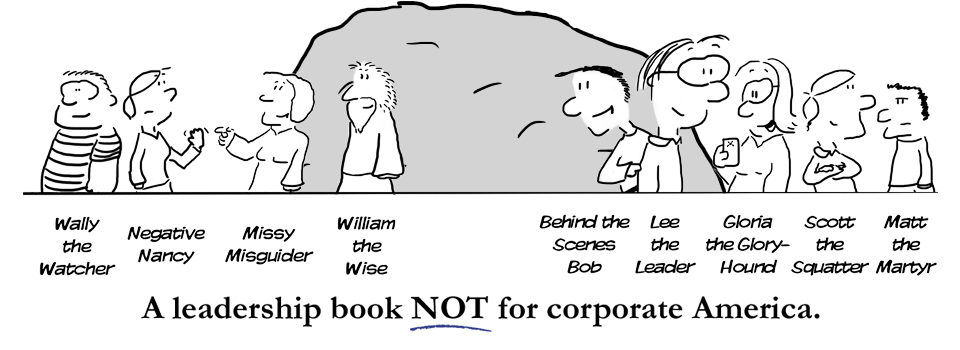A leadership book NOT for corporate America.
“Never doubt that a small group of thoughtful, committed citizens can change the world. Indeed, it’s the only thing that ever has.” ~ Margaret Mead
I could immediately see Tony’s visceral reaction as corners of his mouth curled downward and his nose shot up in disgust when I uttered the words, “We should write a small group leadership book”.
“The world doesn’t need ANOTHER leadership book, Clayton”, Tony replied with a forced smile, as if to hide his initial reaction.
“Yes, but this leadership book wouldn’t be for corporate America”, I shot back.
Tony’s eyes narrowed a bit before he responded, “Then who would it be for?” Having anticipated Tony’s reaction to my statement, I immediately rattled off my well-rehearsed pitch all in the same breath. “It would be a small group leadership book for all of the small volunteer and non-profit groups that are tirelessly working to make the world a little bit better place. You know, the local Lions clubs, the Boys/Girls Scout troops, the church youth groups, the high school booster clubs…”.
Tony certainly looked more intrigued at this point, “Ok, I see where you’re going with this, but what makes you think these sorts of groups even need a book on small group leadership?”
Ok, I admit, that question took me by surprise, so I had to wing my next response, “I see a lot of these small community groups doing a lot of great things. They are putting significant amounts of time, effort, talent, and in some cases money into community projects, often with minimal results. I think we could change that with a book that provides basic leadership skills and group management strategies. After all, we’ve both done this for years, and we both care to help others do it too.”
Tony, now fully engaged by my enthusiasm for the project, smiled and said “Well, I’m really busy and you’re swamped, so the timing couldn’t be better. Let’s get started next week!”
So this book is written for what we call “real world” groups and their leaders. By calling them that, we do not mean to imply that those who work and lead in a corporate setting are not doing real work, only that there is something artificial in many of those contexts that those serving smaller, mission-minded, service organizations neither experience nor fully understand. Their job is usually much harder, not well compensated, and supported with significantly fewer resources.
While we’re sure there is literally an infinite number of significant differences between the world of corporate America and “real world groups”, five major differences primarily stand out to me.
• Unlike corporate America, which has been traditionally organized in a military style, top-down pecking order hierarchy, team work in the real world groups is generally not highly structured; in fact, many real world groups are basically amorphous outside of the appointed leader of the group. This often presents unique challenges when it comes to assigning responsibilities or, worse yet, accountability.
• Real world group team work is generally ungoverned. Federal, state, and local regulations and laws for corporate America often serve as boundaries and guidelines shaping the path forward; however, this is often not true for real world groups making the path undefined and uncertain.
• Teams in real world groups are mostly derived organically, not hand-picked talent. Corporate America has literally created a cottage industry for hiring, evaluating, and training the exact type of talent required for any given project or goal, while most real world groups end up embracing the age-old kindergarten adage, “You get what you get and you don’t get upset”.
• Corporate America can muster vast resources to bear in a timely manner but most real world groups can barely find enough time to gather the necessary resources. Time is as much of a resource as money and in many cases more valuable. Avoidance of labor-intensive options and fear of time wasting missteps often dominate the decision making process of real world groups.
• Corporate America has clearly defined job titles, roles, and duties, whereas real world group teamwork requires members to wear multiple hats dividing focus, creating confusion, breeding frustration, and fueling exhaustion. Often the appointed leader in real world group has to be a primary “rock roller” and still find the time to get down to the business of being an actual leader as well.
With all of the clear advantages corporate America has over these loosely structured, ungoverned, underfunded, mix and match group of misfits all playing so many roles they will probably develop an identity crisis, it is no wonder why so many real world groups struggle to “roll their rock” across the finish line, but yet…. in many cases, they still do.
This book is for all the volunteer and non-profit groups who dismiss all of the advantages of corporate America and find the heart and grit to roll their rock, but a little faster and with less fighting along the way.
Thank you for what you do to make the world a little better place for us all.
